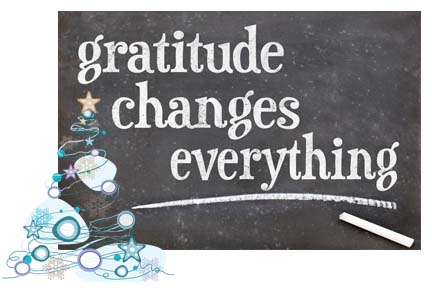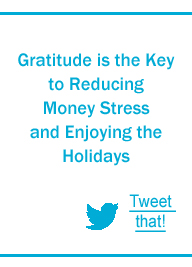By Karin Mizgala, Co-Founder and CEO Money Coaches Canada
 Being grateful has been shown to positively impact our lives. Our ability to experience and express gratitude influences our relationships, our emotional and physical health and even our careers. Yet, we also live in a culture that tells us we need more. This tension is never more obvious than during the Christmas season, with so much pressure for the “perfect” holiday.
Being grateful has been shown to positively impact our lives. Our ability to experience and express gratitude influences our relationships, our emotional and physical health and even our careers. Yet, we also live in a culture that tells us we need more. This tension is never more obvious than during the Christmas season, with so much pressure for the “perfect” holiday.
If you’re struggling with your finances, worried about retirement or your children’s education needs, the expectations inherent to the holiday season can make you far more weary than grateful. Even if you’re doing well financially, there’s lots of temptation that can easily pull us off-track, create stress and foster regret.
Luckily, gratitude acts as a form of insurance against holiday-induced FOMO, unnecessary purchases and overspending.
What?
Yup!
Cultivating gratitude removes the pressure to keep up with the Jones’, buy the latest gadgets and perform the perfect holiday season. When we’re content with what we have, this keeps money in our pocket and maintains our sanity during the most stressful time of the year.
The Intangible Benefits of Gratitude
Gratitude prevents chasing the emotional high of new purchases
Driving a brand new car off the lot feels like the smoothest, most luxurious ride ever. But, the emotional high fades. It’s easy to forget just how smooth that suspension is once you’ve driven the car for several months. The same is true for buying stuff during the holidays—and the rest of the year. The more satisfied you are with what’s already yours, the less likely you’ll be to succumb to excessive indulgence when the mood strikes.
Gratitude is professionally magnetic
For independent consultants and entrepreneurs, expressing appreciation for an opportunity like a work referral or project goes a long way towards securing the next gig. Folks who know and feel you’re grateful for the work are inclined to give you more. Sending thank you cards and small tokens goes a long way towards building goodwill and social capital. It doesn’t need to break the bank—it’s the thought that counts.
Gratitude improves daily life
Choosing to dwell on positive moments and achievements allows minor slights to wash off your back while you remain relaxed, optimistic and resilient when new challenges crop up. Practicing gratitude also works to reverse a scarcity mindset which can inject an unnecessary layer of negative emotion to money. Regularly appreciating what we have removes the focus from money that’s not in our bank account, and allows more room for objectivity and positivity. Our outlook on money is similar to how we drive a car: we steer towards where we want to get to.
The Action Plan
Taking a cue from Pavlov, we can train ourselves to cultivate gratitude and seek out the positive. I know some of the pessimists and cynics might be rolling their eyes now, but gratitude does make you feel better. Habits are habitual, so try incorporating gratitude as a daily practice and see how you feel. Don’t worry if you forget a few times (I know I need reminders!) —that’s normal when beginning a new routine.
Here are some practical ways to cultivate gratitude throughout your day:
- Start a gratitude journal and jot down 2-3 items each day
- Meditate on daily moments of appreciation
- Throughout the day pause and reflect on positive moments
- Use a notebook or keep an accomplishment list on your phone
When you add something to your list, take a moment to appreciate the opportunities, circumstances or people that supported you. Nothing succeeds like success.

When it comes to gratitude, size doesn’t matter
You can practice gratitude on your daily commute, during your workout, while you walk your dog or as you brush your teeth. Think of one or two things you are grateful for and why. They don’t have to be big things; noticing the small things in your life makes you more attentive to all the good surrounding you. Try to come up with new items every day.
No matter how silly or insignificant it may feel, share your gratitude. That means when you’re performing your gratitude ritual and find yourself appreciative of something a family member, friend, or co-worker did, let them know that their actions are appreciated—especially for the little things. Mentioning to a neighbor how much you appreciate their Christmas lights will do the trick and make you both feel great.
Thank you to our clients, staff, readers and the entire Money Coach network. We’re grateful to be part of such a supportive, creative and genuine community. We’re looking forward to another year together.
Need any last minute money questions answered before the holidays? We’re here to help.


